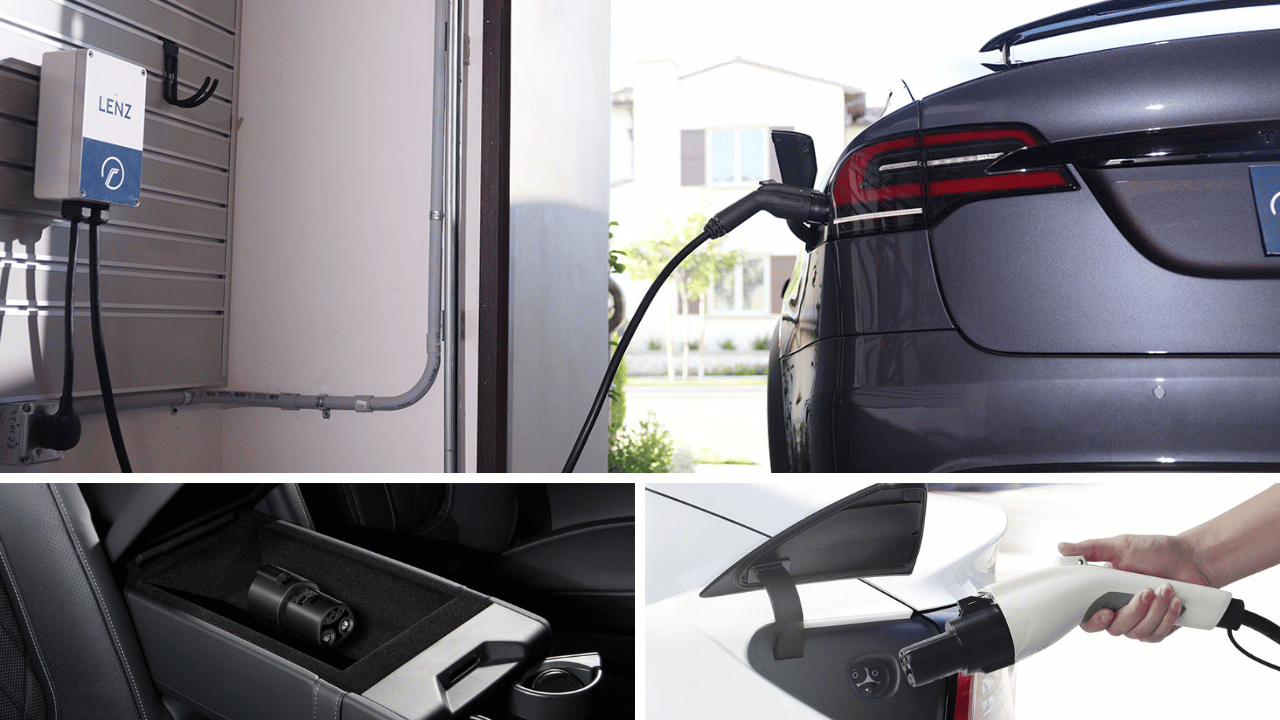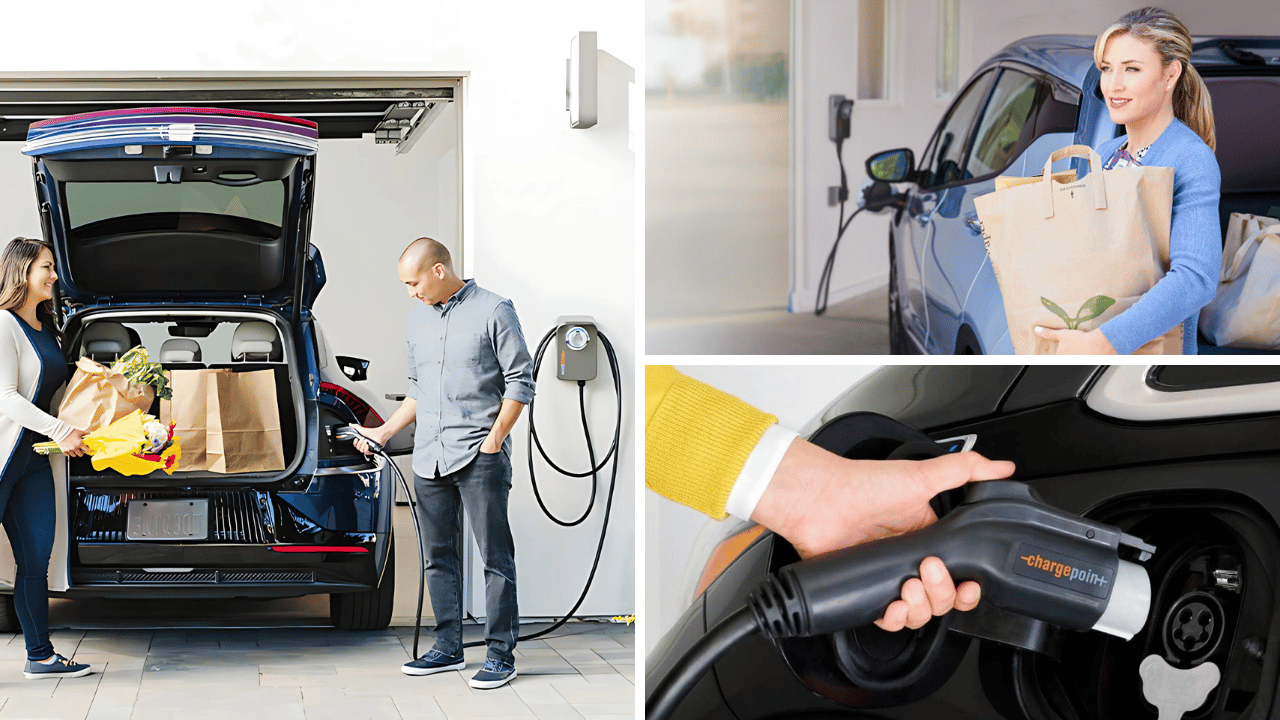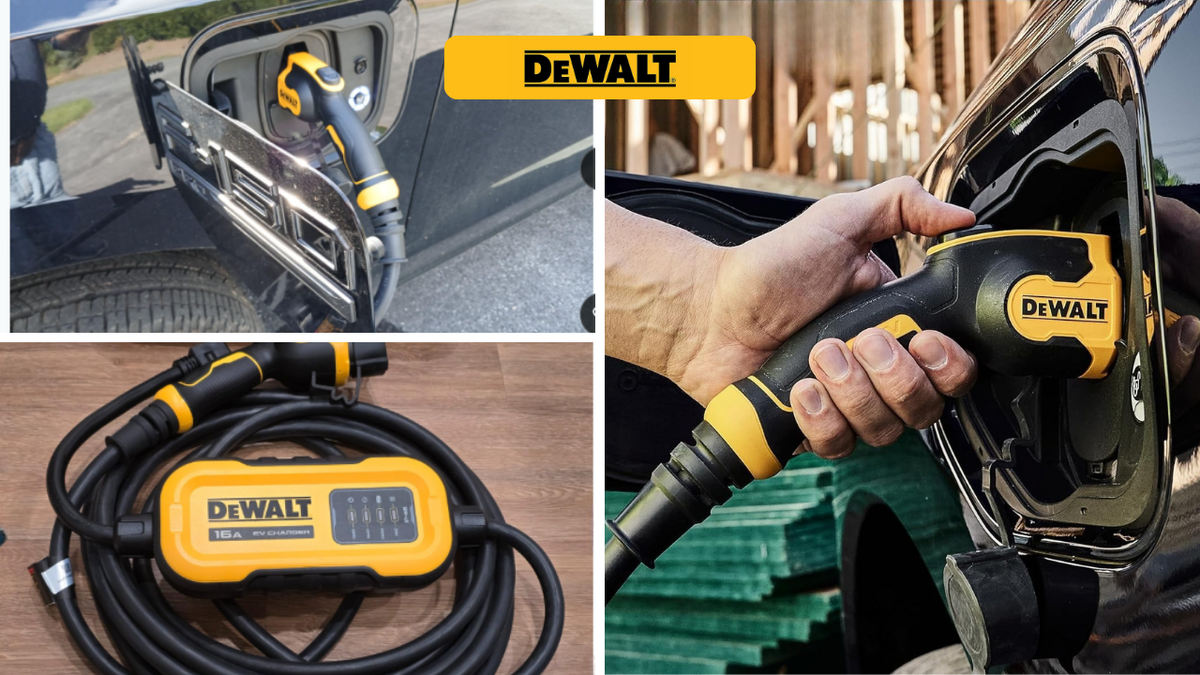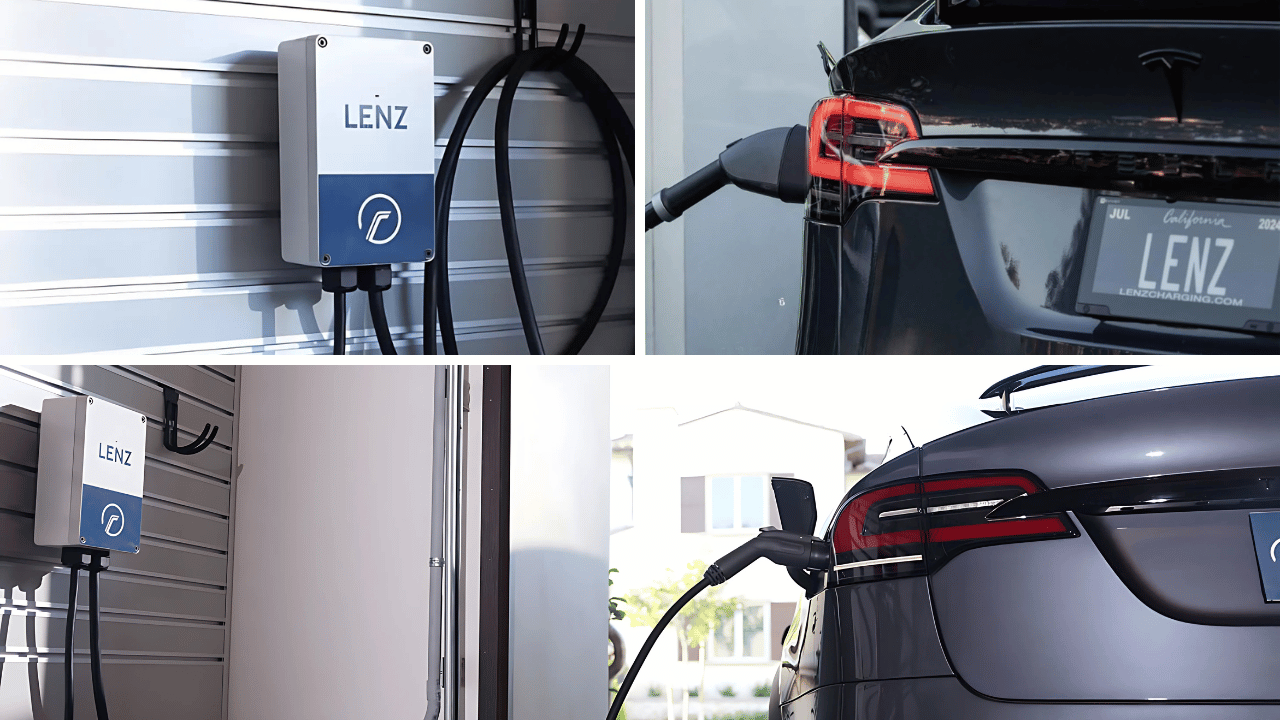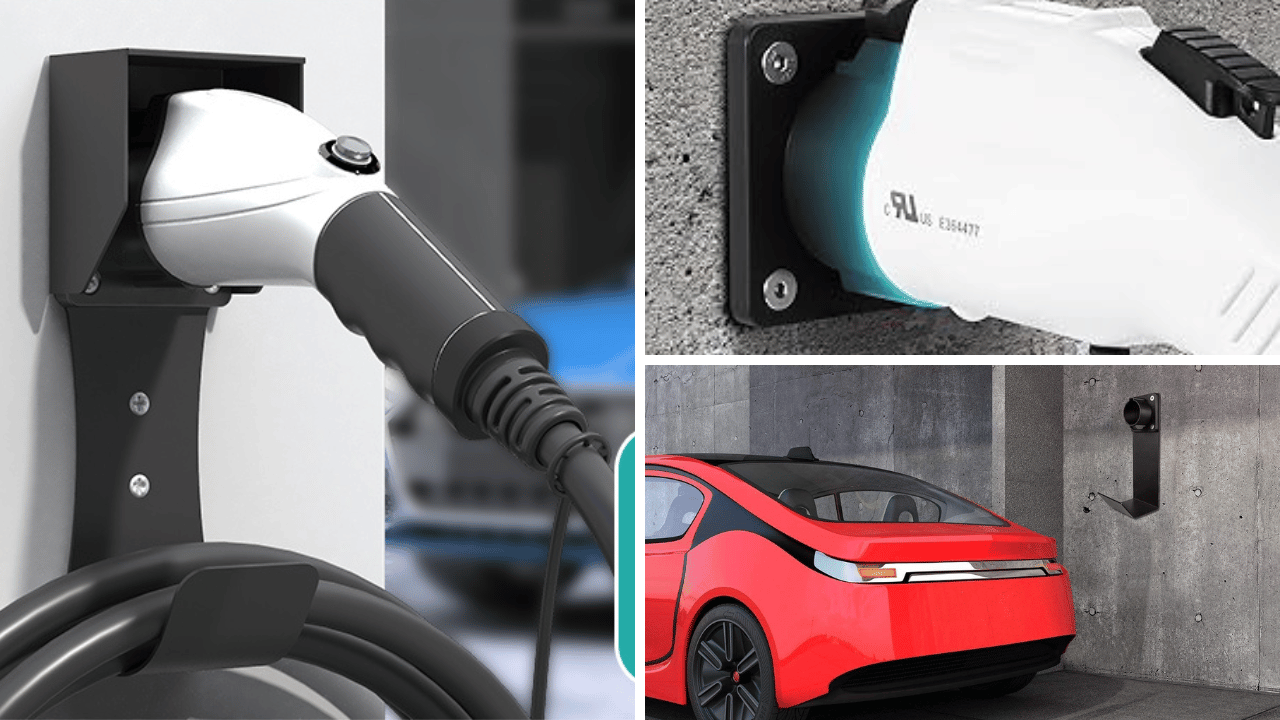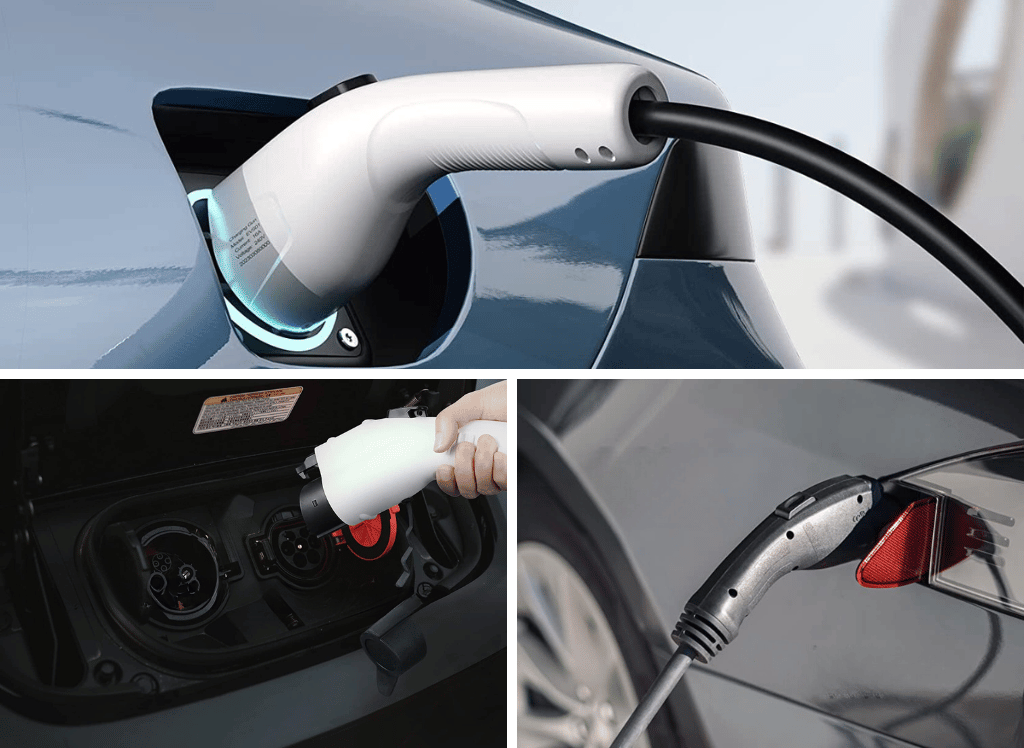Install A Level 2 EV Charger for Home Use
Compare the best home EV chargers for charging speed, innovative features, safety, and installation.
Welcome to Mechanicaddicts. As an Amazon Associate, we earn from qualifying purchases (at no cost to you) from links found within these pages if you choose to buy something.
Electric vehicles and level 2 charging stations have transformed from niche curiosities into mainstream transportation solutions, with over 10 million EVs on American roads. As more drivers make the switch, the need for reliable home charging infrastructure becomes increasingly critical.
A Level 2 charging station at home offers greater convenience and faster charging compared to public options, making it an essential upgrade for most EV owners. While public charging networks continue expanding, nothing beats the convenience of plugging in at home and waking up to a fully charged vehicle, especially with a reliable installation.
Selecting the right home charger for electric vehicles involves more than just finding the cheapest option. The ideal charger balances charging speed, safety features, smart capabilities, and long-term reliability for EV drivers. A well-chosen charger can reduce charging time by hours compared to standard wall outlets; in this context, 'charge time' refers to how long it takes to replenish your EV's battery from empty to full. Smart features help optimize energy costs and protect your home’s electrical system.
This comprehensive guide examines the best EV chargers and the top home EV chargers available today, breaking down the technical specifications that matter most. We’ll explore everything from level 2 amperage ratings and certification requirements to installation considerations and smart features that can transform your charging experience. Whether you’re a new EV owner or looking to upgrade your current setup, this analysis will help you make an informed decision about selecting the best Level 2 EV charger that serves your needs for years to come.

Understanding EV Charger Levels
EV charging technology divides into three primary categories, each serving different use cases and speed requirements. Understanding these distinctions helps clarify why Level 2 chargers dominate the home market, outpacing traditional charging stations in efficiency.
Level 1 charging uses standard 120V household outlets, delivering approximately 2-5 miles of range per hour. While this works for plug-in hybrids or drivers with minimal daily commutes, most EV owners find Level 1 charging inadequately slow for regular use, particularly when considering charging time.
Level 2 charging operates on 240V circuits, similar to those used for electric dryers or water heaters. These units deliver 10-60 miles of range per hour, depending on the vehicle and charger specifications. Level 2 represents the sweet spot for home installations, providing practical charging rates without the infrastructure costs of DC fast charging.
DC Fast Charging bypasses the vehicle’s onboard charger, delivering high-voltage DC power directly to the battery. These commercial-grade DC fast chargers can add 100-300 miles in 20-30 minutes, but require specialized equipment and three-phase power unsuitable for residential use.
Level 2 chargers typically operate at 240V with amperage options ranging from 16A to 80A; however, 32A, 40A, and 48A are the most common residential configurations. Higher amperage translates directly to faster charging speeds, limited only by your vehicle’s maximum charging rate and your home’s electrical capacity. The charge rate, typically measured in kilowatts (kW), determines how quickly energy is delivered to your EV and directly impacts how long it takes to charge the battery fully.

Key Factors for Choosing Your Home EV Charger
Charging Speed and Amperage
Amperage determines how quickly your EV charges, making it the most critical specification to consider. A 32A charger delivers approximately 7.7kW of power, significantly reducing the charging time and adding roughly 25-30 miles of range per hour to most EVs. Upgrading to a 40A unit (9.6kW) increases this to 30-35 miles per hour, while 48A chargers (11.5kW) can deliver 35-40 miles per hour.
However, your vehicle's onboard charger creates an upper limit. Many entry-level EVs accept only 7.2kW (30A), while premium models like Tesla Model S can handle up to 11.5kW (48A). Installing a higher-amperage charger than your vehicle can use provides future-proofing but won't immediately improve charging speeds.
Safety and Certification Standards
Home EV chargers must meet stringent safety standards to protect your family and property when using a home electric vehicle (EV) charger. Look for units certified by Underwriters Laboratories (UL), Intertek (ETL), or the Canadian Standards Association (CSA). These certifications verify that the charger has undergone rigorous testing for electrical safety, fire resistance, and electromagnetic compatibility.
NEMA weatherproof ratings indicate how well the charger withstands outdoor conditions. NEMA 4 rating protects against wind-driven rain and splashing water, making it suitable for garage installations. NEMA 4X adds corrosion resistance for coastal areas or harsh climates.
Energy Star certification ensures the charger meets strict efficiency standards and may include smart features, minimizing electricity waste during charging. While not mandatory, Energy Star units often qualify for utility rebates and demonstrate the manufacturer's commitment to quality, frequently incorporating innovative charging features.
Smart Features and Connectivity
Modern EV chargers increasingly offer smart features that enhance convenience and control, including various connector types. Wi-Fi connectivity enables remote monitoring through smartphone apps, allowing you to start or stop charging sessions, schedule charging during off-peak hours, and track energy consumption.
Load balancing technology automatically adjusts charging power based on your home's total electrical demand, preventing circuit overloads while maximizing charging speed. This feature becomes particularly valuable in homes with two EVs or high electrical loads.
Solar charging modes optimize charging when solar panels generate excess power, maximizing the use of clean energy and reducing grid dependence. Some advanced units can even pause charging when solar production drops and resume when the sun returns.
Cable Length and Installation Flexibility
Cable length significantly impacts installation flexibility and daily usability. Standard 25-foot cables work well for most garage configurations, but longer cables provide options for parking in different locations or accommodating multiple vehicles.
Consider your EV's charging port location when evaluating cable length needs. Front-mounted ports (like on Nissan LEAF) may require different positioning than rear corner ports (Tesla models) or side-mounted ports (many German EVs).
Hardwired installations offer the cleanest appearance and eliminate concerns about unplugging, but require professional installation and electrical permits. NEMA plug-in options provide flexibility to relocate the charger if needed and often allow DIY installation if an appropriate outlet already exists.

Household Circuit Output: What Your Home Can Handle
Before installing an EV charger at home, it’s crucial to understand what your household electrical system can safely support. The heart of this decision lies in your electrical panel’s maximum amperage ,the total amount of electrical current your home can handle at once for a dedicated circuit. Most modern homes are equipped with either a 100-amp or 200-amp main breaker, which must supply power to all your appliances, lighting, HVAC, and now, your EV charging equipment.
To determine the best EV charger for your needs, start by evaluating your electrical panel’s available capacity. A certified electrician can perform a load calculation to see how much amperage is left for a new circuit dedicated to EV charging. For example, a 40-amp Level 2 EV charger, which delivers fast charging speeds and is compatible with most electric vehicles, requires a dedicated 50-amp circuit to operate safely. If your panel is already near capacity, you may need to upgrade your electrical system or opt for a charger with a lower power output.
It’s also important to match the charger’s power output and connector type to your specific vehicle. While most EV drivers benefit from a Level 2 charger, plug-in hybrid vehicles may not require as much charging power, and non-Tesla vehicles often use the J1772 connector, while Tesla vehicles use the North American Charging Standard (NACS). Smart charging features and various connector types, along with Wi-Fi connectivity, can further optimize your charging experience.
Suppose you’re considering future-proofing your setup for two vehicles or planning to upgrade to a vehicle with higher charging capabilities. In that case, it’s wise to install a circuit that can handle maximum power output now.
This approach can save on future installation costs and ensure you’re ready for faster charging as technology evolves, taking into account the charging rate. However, DC fast charging, which offers the fastest charging speeds, typically requires much higher amperage and is not suitable for most residential electrical panels.
Top 6 Home EV Chargers:
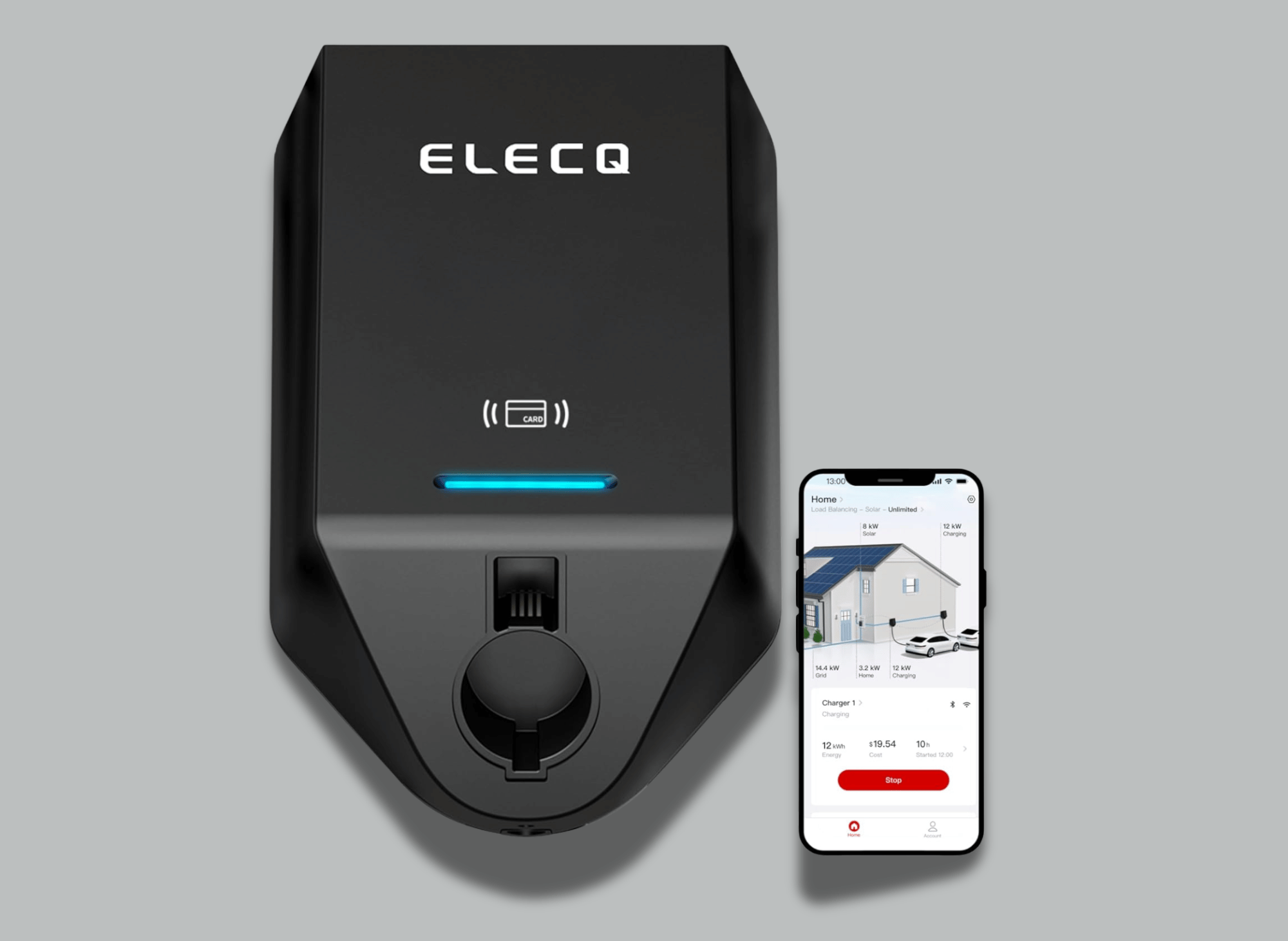
ELECQ Level 2 EV Charger with Smart Charging
Solar Mode & Active Load Management, OCPP Compatible Electric Car Charger, Wi-Fi Enabled for Full Control, 50A Fast EVSE with Hardwired and J1772
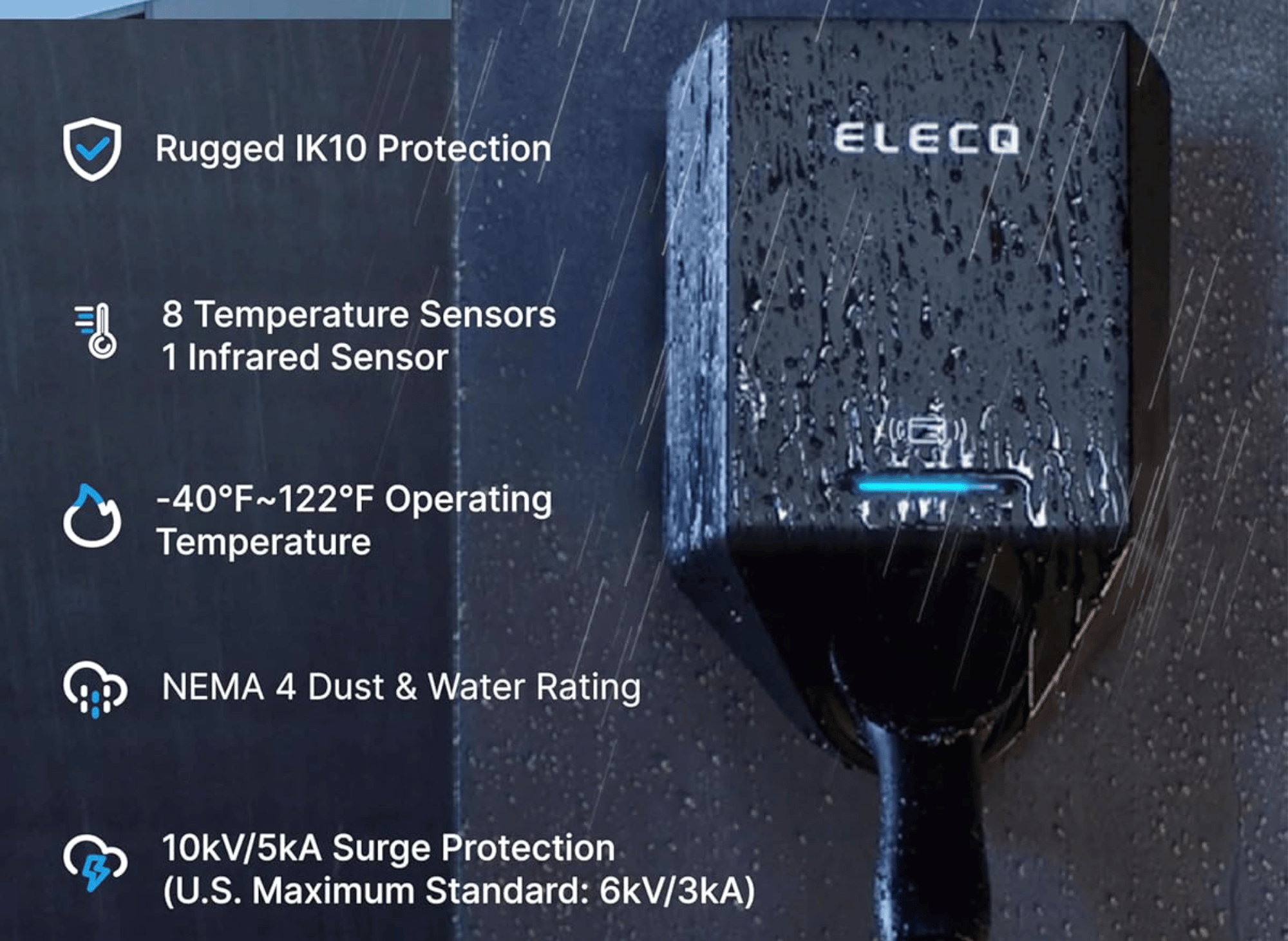
ELECQ Level 2 EV Charger
The ELECQ charger delivers robust 40A charging capability with comprehensive smart features wrapped in a weatherproof package. This unit stands out for its intuitive app interface and extensive safety certifications, making it an excellent choice for tech-savvy EV owners.
Key specifications include a 40A charging capacity (9.6kW), UL and Energy Star certifications, a NEMA 4 weatherproof rating, and a 25-foot cable length. The integrated Wi-Fi enables remote monitoring, scheduling, and energy tracking through the ELECQ mobile app. Load balancing functionality prevents electrical overloads while maximizing charging speed.
Customer reviews consistently praise the ELECQ's build quality and app functionality, though some users note the initial app setup can be complex. The unit includes surge protection and operates reliably in temperatures from -30°F to 122°F. Installation options include both hardwired and NEMA 14-50 plug-in configurations.
The three-year warranty covers parts and labor, with responsive customer support available through phone and email channels.
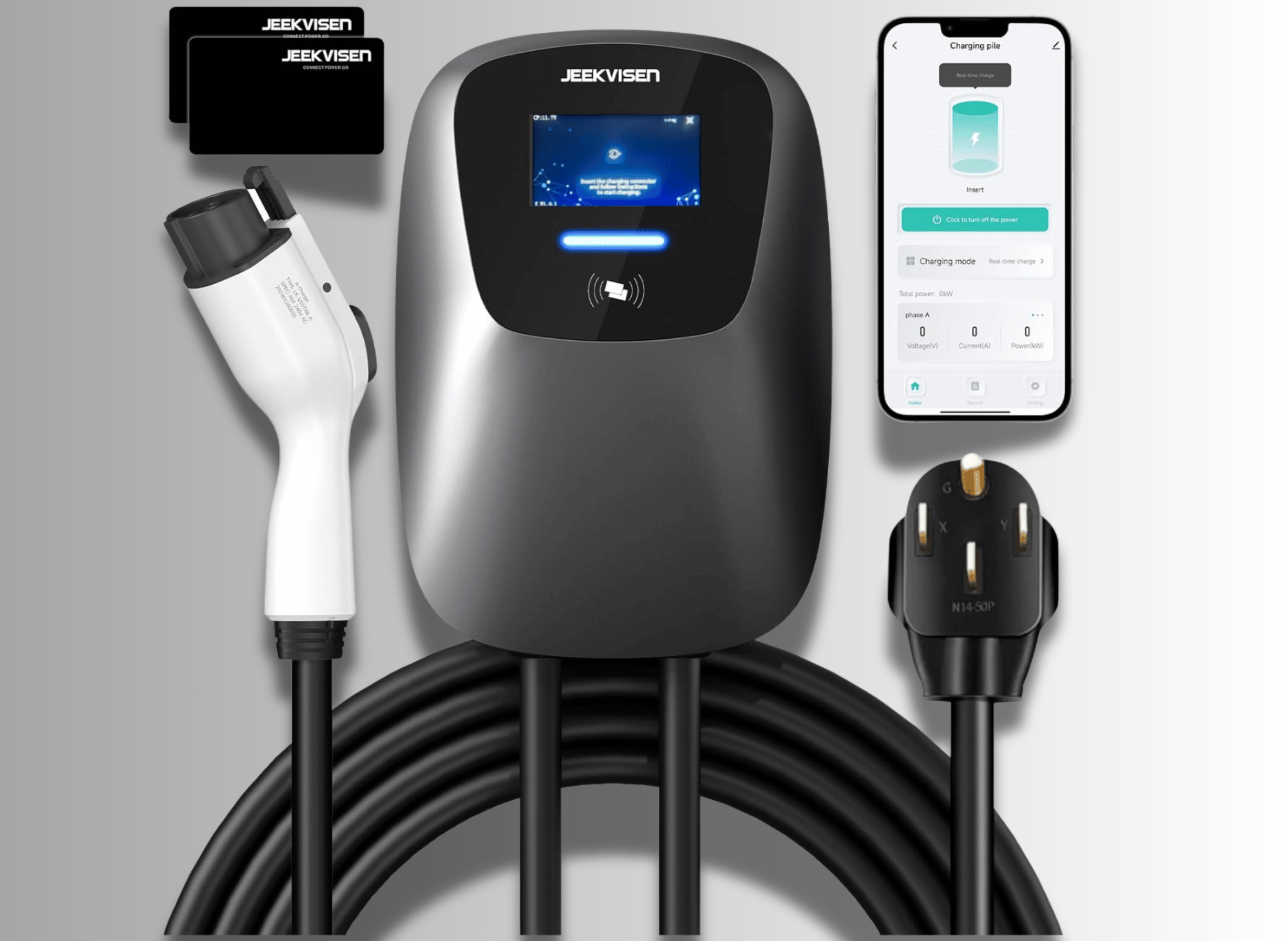
Jeekvison Level 2 EV Charger
48 Amp 240V NEMA 14-50 Plug: Electric Vehicle Charging Station with APP Control, WiFi Enabled EVSE, RFID Card - Compatible with Tesla and All EV Brands (Gray)
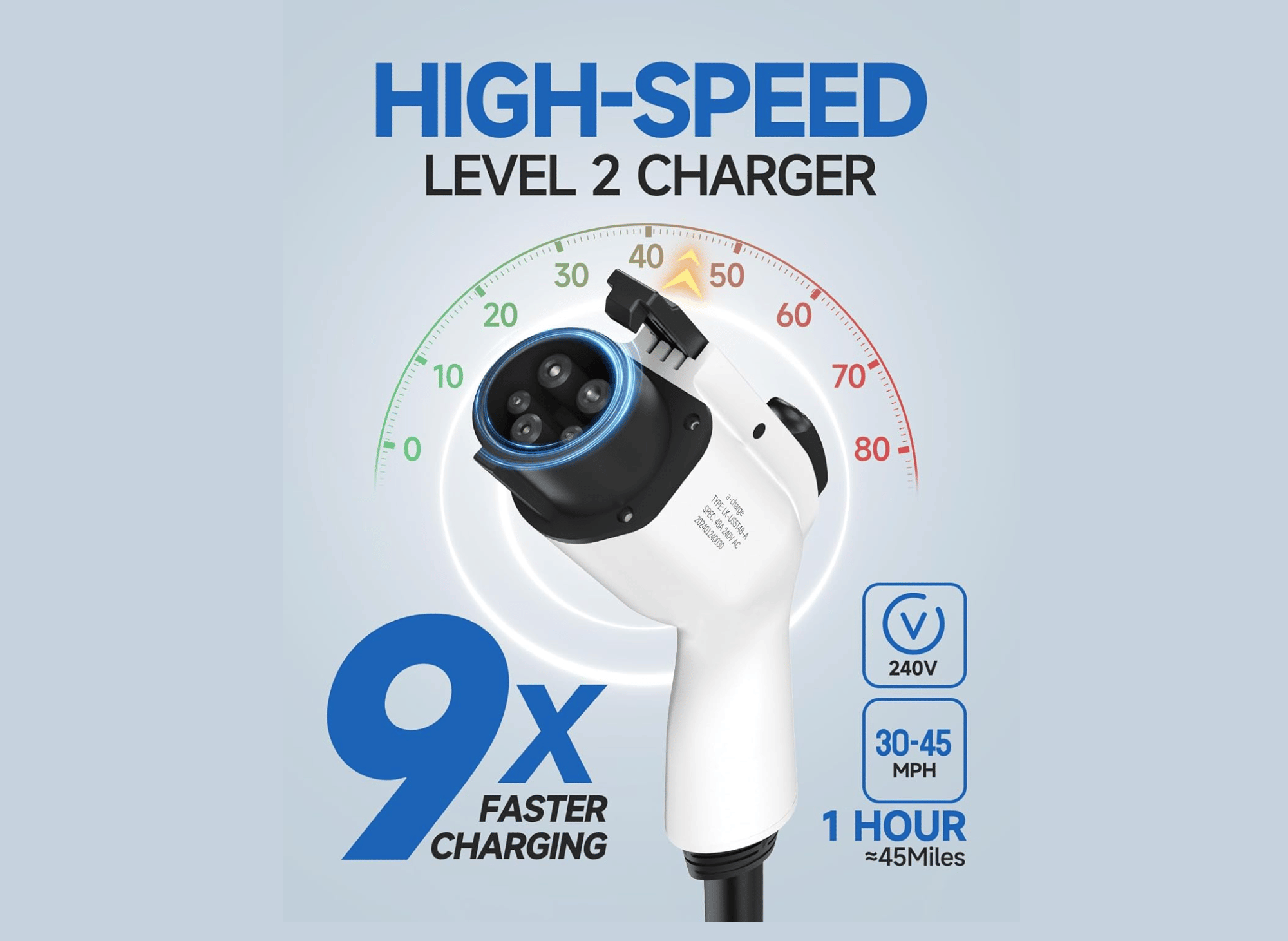
Jeekvison Level 2 EV Charger
Jeekvison focuses on delivering reliable charging performance at an accessible price point. This 32A unit provides solid charging speeds with essential smart features while maintaining competitive pricing for budget-conscious buyers.
The 32A rating delivers 7.7kW charging power, suitable for overnight charging of most EVs. UL and CSA certifications ensure safety compliance, while the NEMA 4 rating provides weather protection for garage installations. The 25-foot cable accommodates most parking configurations without requiring extension.
Smart features include Wi-Fi connectivity, smartphone app control, and scheduling capabilities. The app interface focuses on essential functions rather than advanced features, making it straightforward for users who prefer simplicity in selecting connector types. RFID card access control adds security for shared charging installations.
Installation flexibility comes from both hardwired and plug-in options, with clear installation instructions included. Customer feedback highlights the unit's reliability and straightforward operation, contributing to easy installation, though some desire more advanced app features found in premium models.
Jeekvison backs their charger with a comprehensive three-year warranty and maintains responsive customer service.
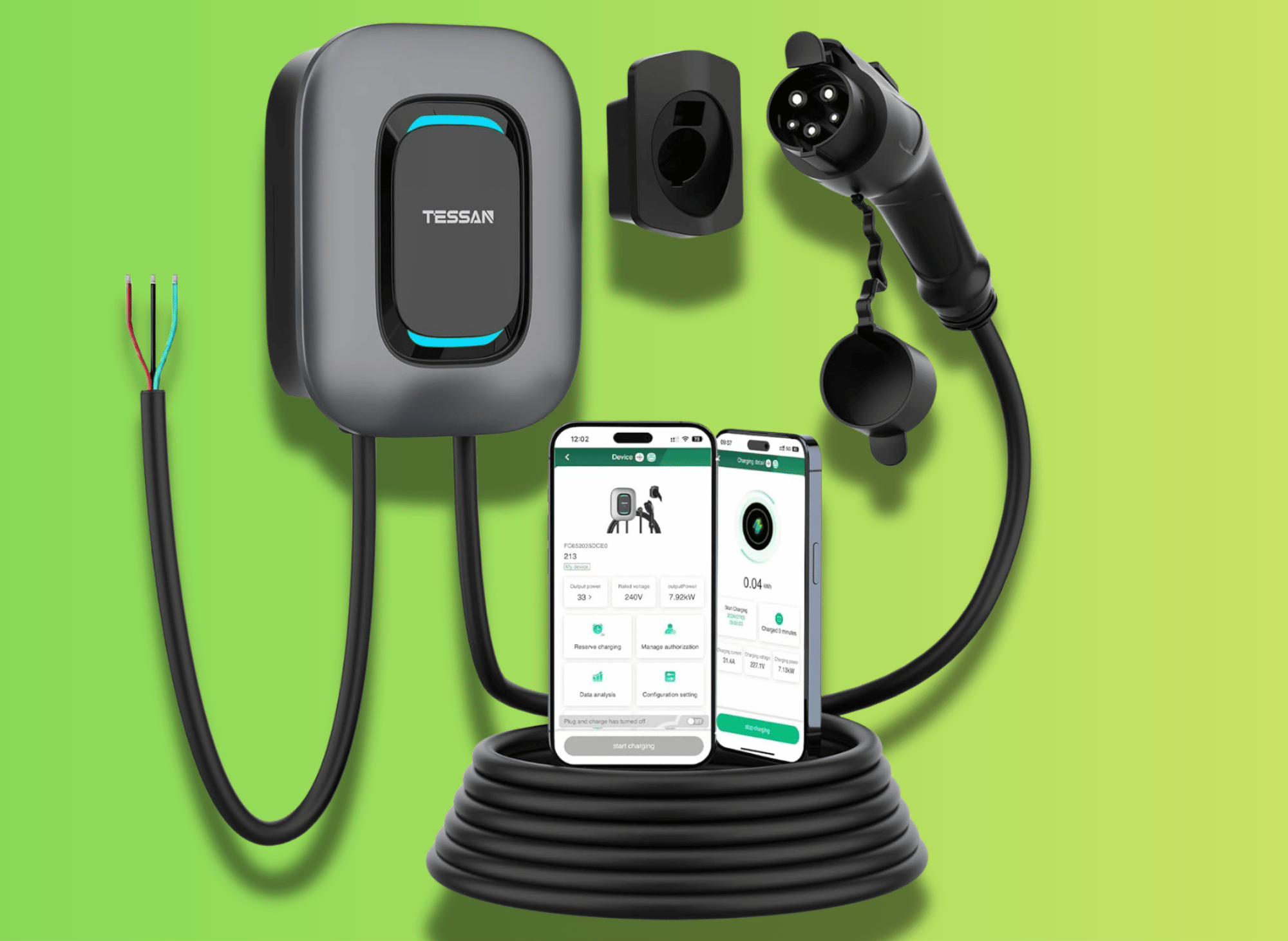
TESSAN Level 2 EV Charger
Hardwired Electric Vehicle Fast Charging Station, 48A/240V Smart Equipment App Control Wi-Fi (Only 2.4Ghz)& Bluetooth, 25ft Cable with Holder for Indoor Outdoor Home
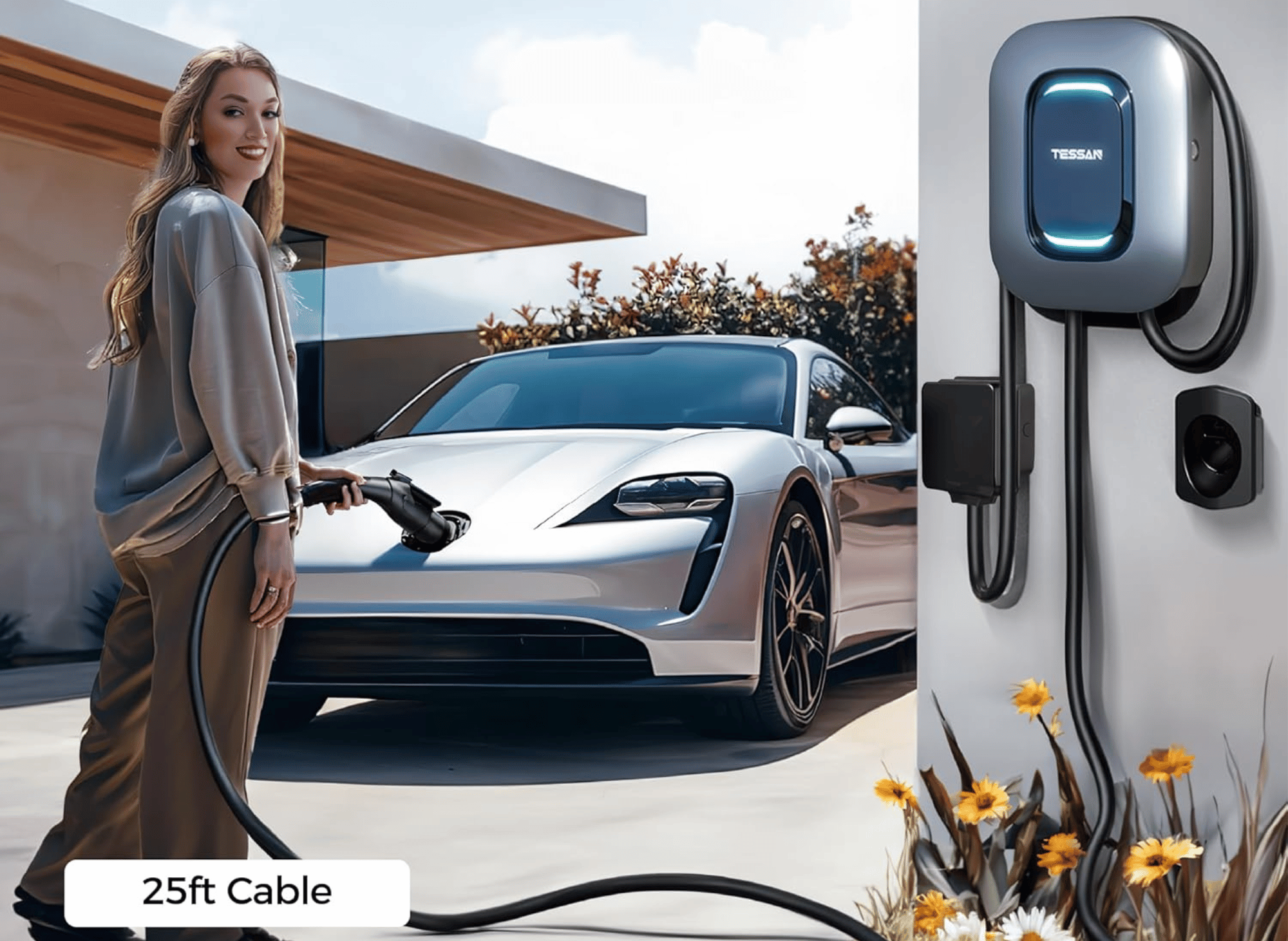
TESSAN Level 2 EV Charger
TESSAN combines premium build quality with advanced smart features, targeting users who want the latest charging technology. This 48A unit delivers maximum home charging speeds while offering sophisticated energy management capabilities.
The 48A capacity provides 11.5kW charging power, among the fastest speeds available for home use. Multiple safety certifications, including UL, ETL, and Energy Star, demonstrate TESSAN's commitment to quality and efficiency. The NEMA 4X rating provides enhanced corrosion resistance for challenging environments.
Advanced innovative features include solar charging integration, dynamic load balancing, and detailed energy analytics. The companion app offers extensive customization options, allowing users to create complex charging schedules based on electricity rates, solar production, or personal preferences, including compatibility with the NACS connector. Voice control integration works with Amazon Alexa and Google Assistant.
The premium build quality shows in details like the sturdy mounting bracket, high-quality cable management, and intuitive LED status indicators. Installation requires professional setup for hardwired configurations, though NEMA 14-50 plug-in options are available.
TESSAN offers a five-year warranty, the most extended coverage in this comparison, along with 24/7 technical support.
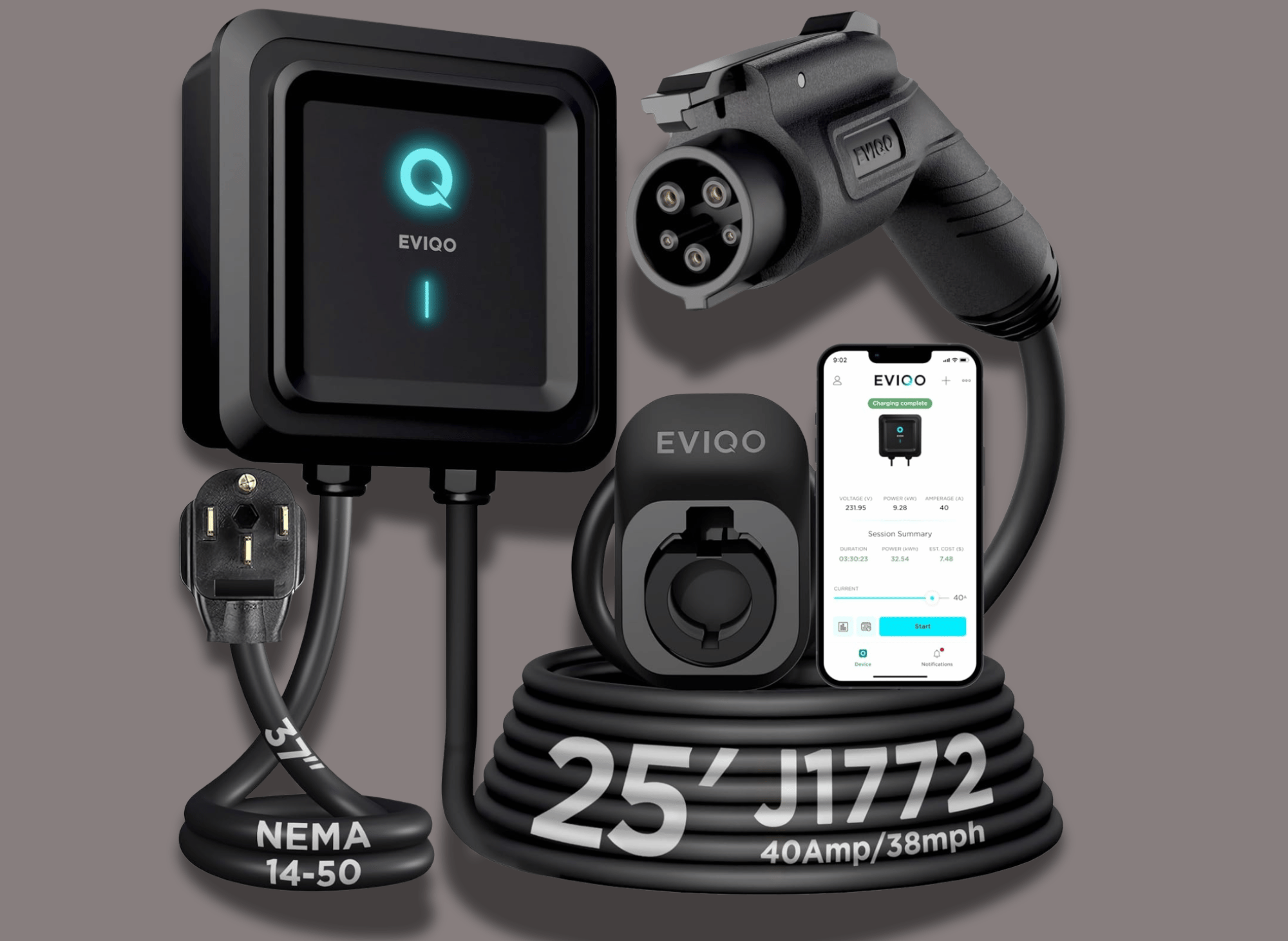
EVIQO Level 2 EV Charger
40 Amp - 9.6 kW 240V Wall Home EV Charger Level 2, NEMA 14-50 Plug, J1772 25' Cable - Enhanced Wi-Fi – UL, ETL Certified EVSE, Smart Electric Vehicle Charging Stations – GEN 2
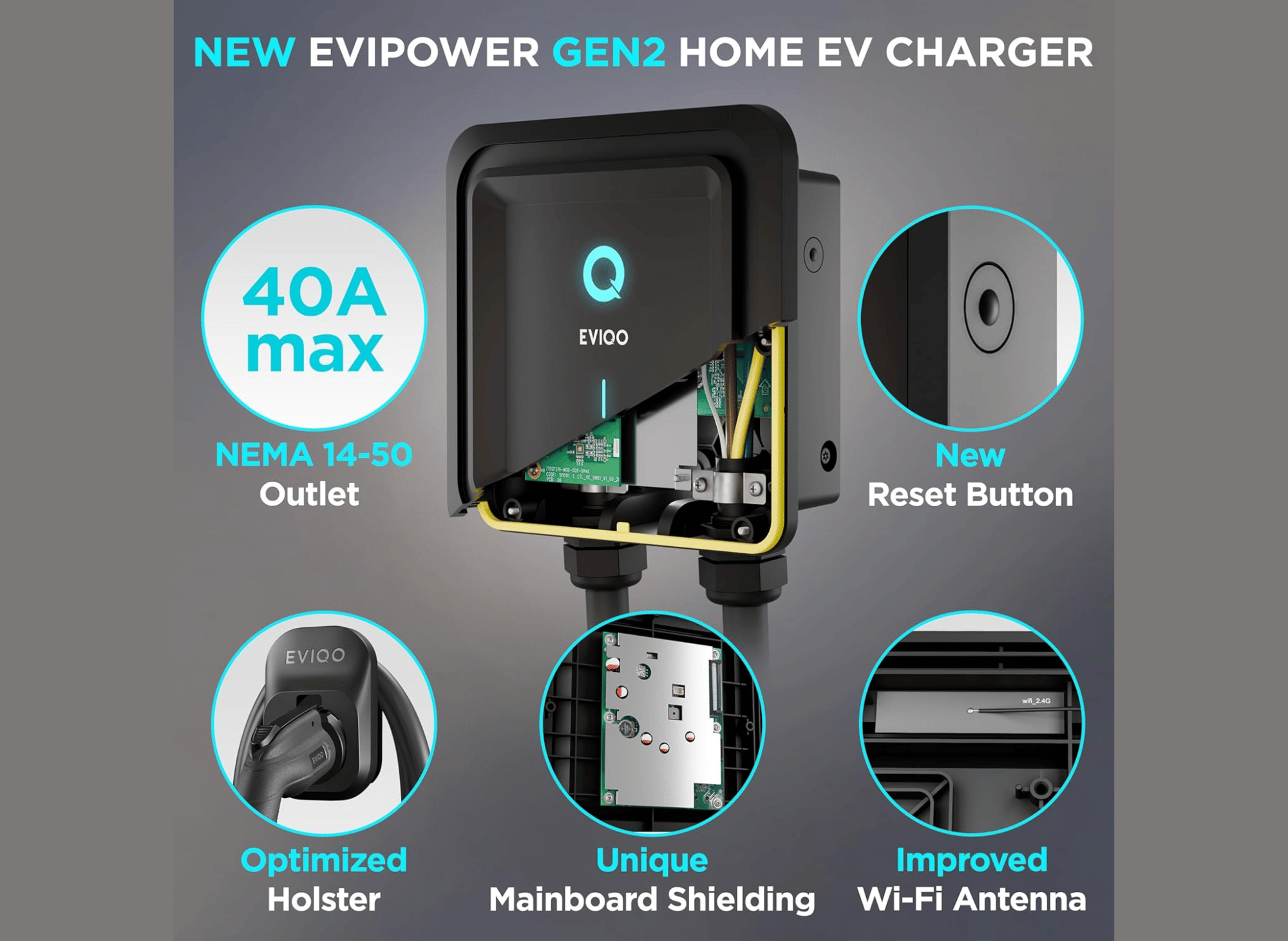
EVIQO Level 2 EV Charger
EVIQO emphasizes user-friendly design and reliable performance, making EV charging accessible for mainstream adopters. This 40A charger balances charging speed with practical features that prioritize ease of use.
The 40A rating delivers 9.6kW charging power with UL and Energy Star certifications, ensuring safety and efficiency. NEMA 4 weatherproofing protects against rain and dust, suitable for most garage environments. The generous 25-foot cable provides parking flexibility without requiring permanent positioning according to plug type.
Innovative capabilities focus on essential functions rather than advanced features. The mobile app enables remote start/stop control, basic scheduling, and charging status monitoring. Simple LED indicators provide at-a-glance status information without requiring smartphone access.
EVIQO designed their installation process for straightforward setup, with clear instructions for both hardwired and plug-in configurations. The mounting system accommodates various wall types and orientations. Customer support emphasizes installation assistance and troubleshooting guidance.
The two EV units include a standard three-year warranty with accessible customer service during business hours.
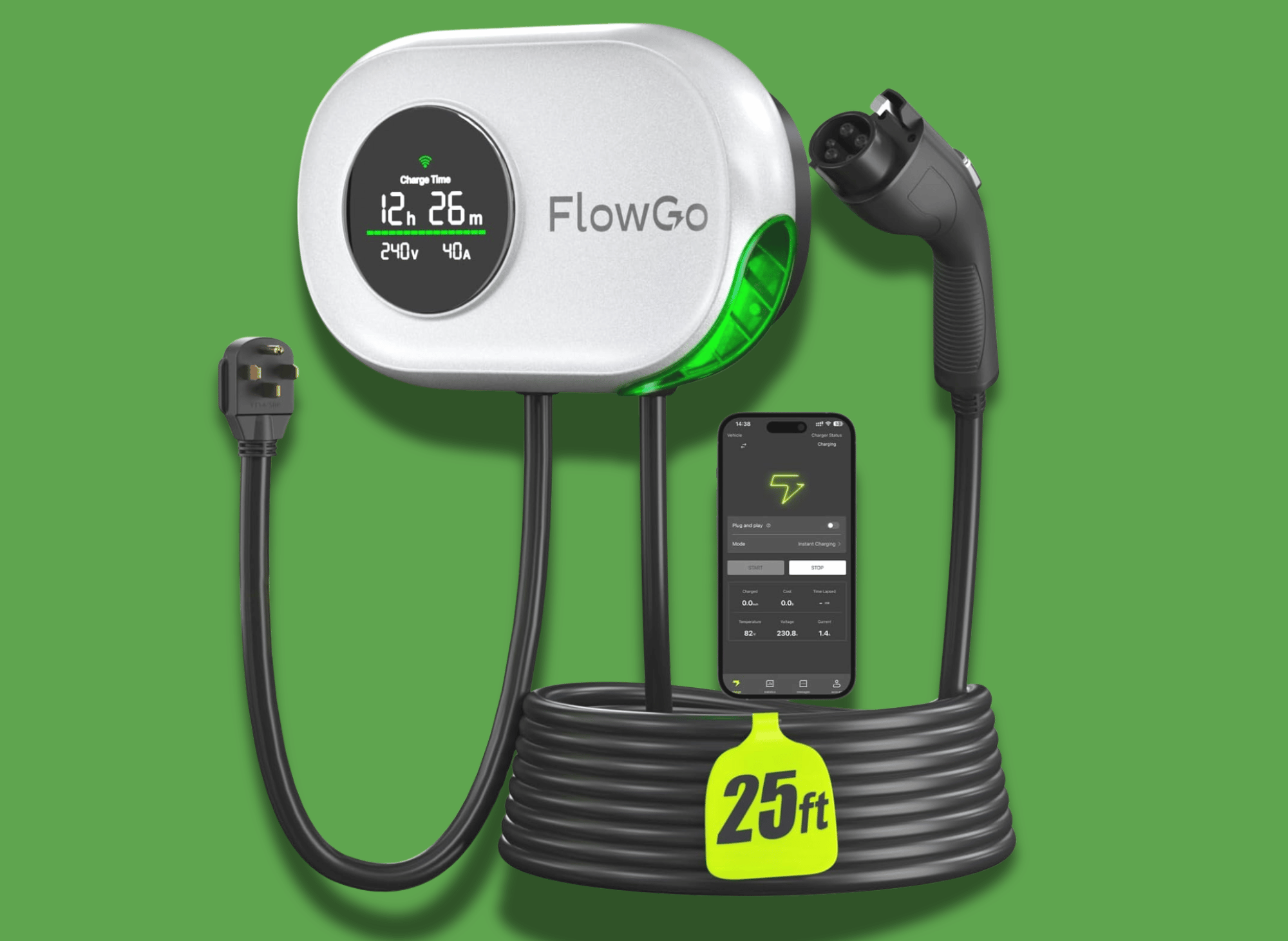
FlowGo Level 2 EV Charger
40A Smart Electric Car Home Charger Motion-Activated Display 240V with NEMA 14-50 Plug J1772 Connector 25FT Cable APP and WiFi Vehicle Charging Stations ETL Listed
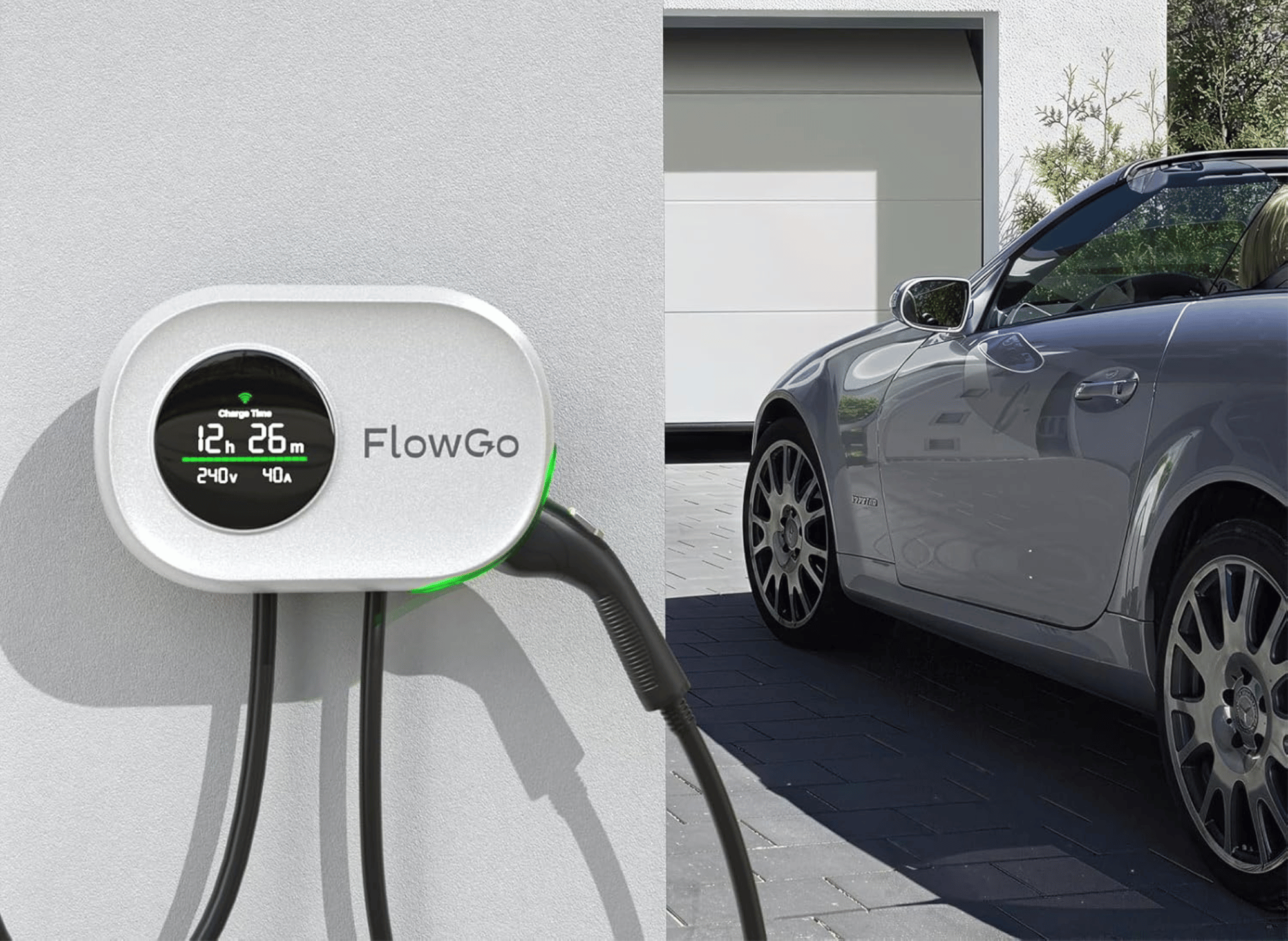
FlowGo Level 2 EV Charger
FlowGo targets value-conscious buyers who need reliable charging without premium features. This 32A charger offers essential functionality at a competitive price, making it ideal for first-time EV owners or secondary charging locations.
The 32A capacity delivers 7.7kW of charging power, with basic UL certification that meets safety requirements. NEMA 4 weatherproofing provides adequate protection for garage installations, while the 20-foot cable works for most single-vehicle setups, though it may limit parking flexibility.
Innovative features are kept to a minimum, focusing on core functionality rather than advanced capabilities. Basic Wi-Fi connectivity enables smartphone monitoring and simple scheduling through a straightforward app interface. The emphasis stays on reliable charging rather than energy analytics or advanced controls, making them suitable for various charging stations.
Installation options include both hardwired and NEMA 14-50 plug-in configurations, with simplified instructions tailored to your plug type, designed for DIY installation where permitted. The compact design is ideal for use in space-constrained garages or carports.
FlowGo offers a two-year warranty with email-based customer support, reflecting its budget-focused positioning, especially at a price hundreds below other models.
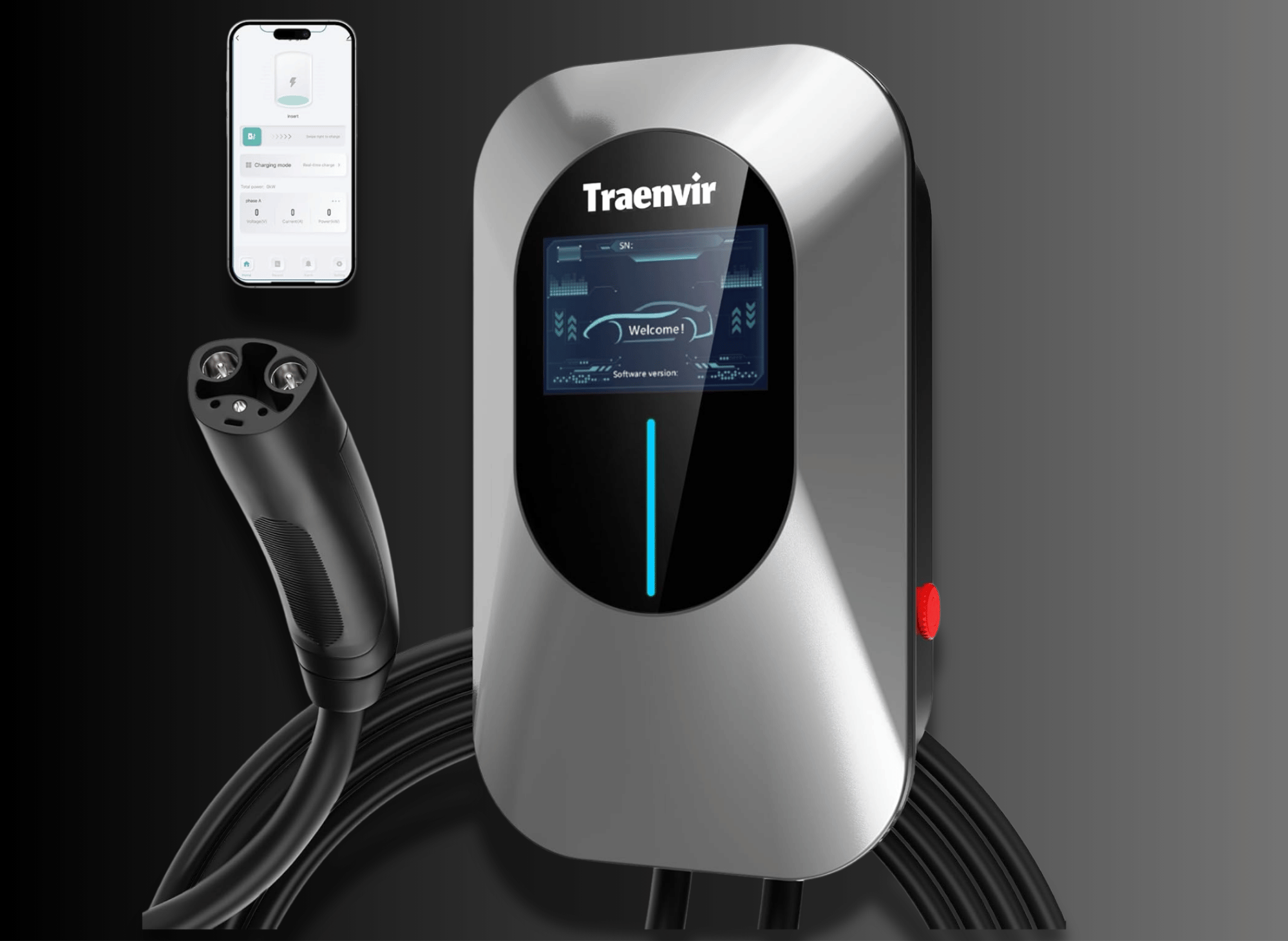
Traenvir Level 2 EV Charger for NACS
EV Charger Level 2 48A, 240V Wall Electric Car Chargers for Home, NACS Connector with NEMA14-50 Plug, 4.3in Smart Display, IC Card, APP Control, 25FT Cable
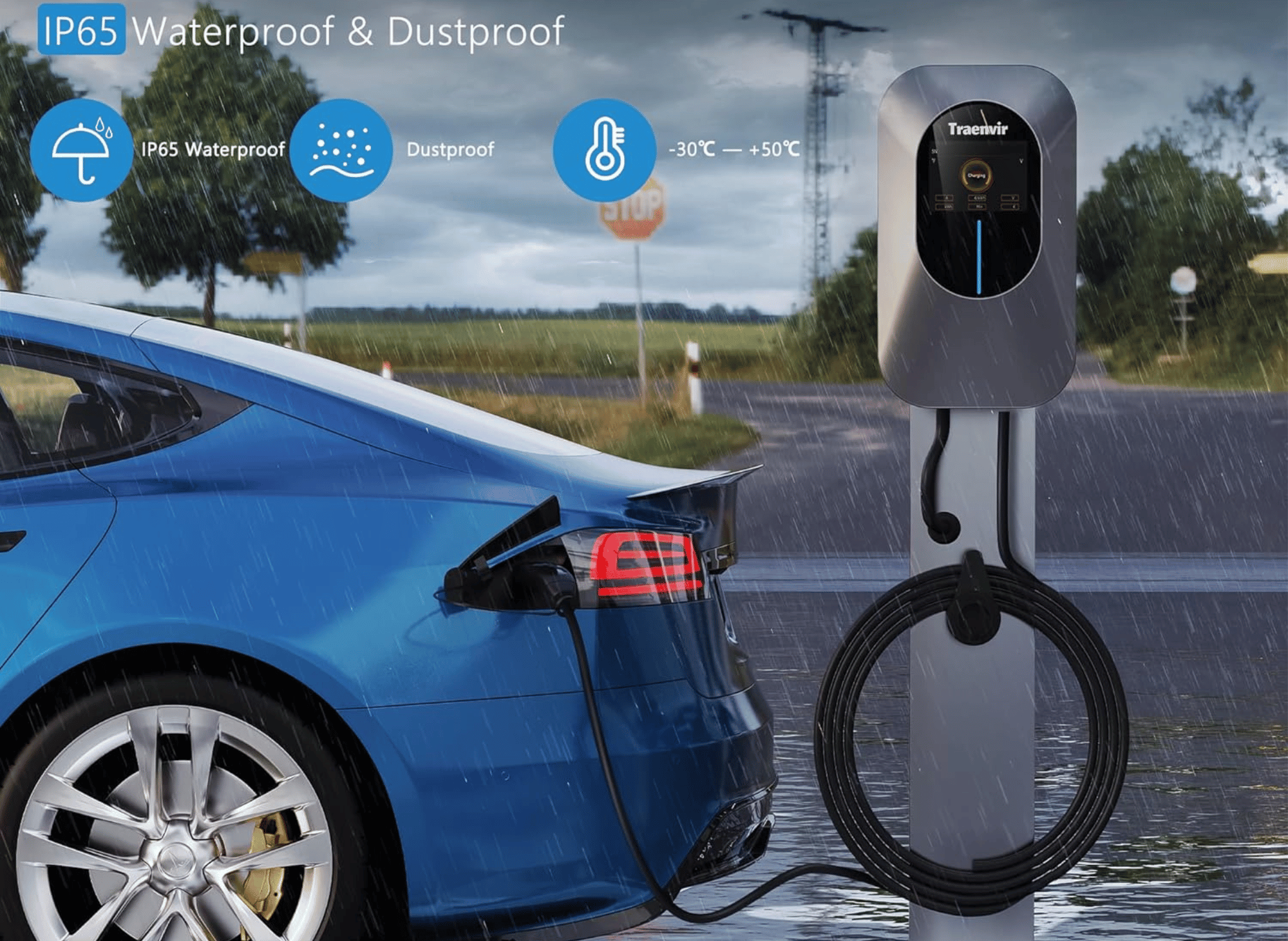
Traenvir Level 2 EV Charger for NACS
The Traenvir charging post boasts 48A Level 2 fast-charging technology, connecting to a 240V power source through a NEMA14-50 plug. This setup delivers a power output of up to 11.5kW, enabling rapid energy replenishment for your vehicle.
Its 25-foot charging cable offers flexibility, making it suitable for various scenarios, such as garages or outdoor spaces. With an IP65 protection rating, it is resistant to rain, water splashes, and dust, ensuring reliable outdoor use.
The charging post features a 4.3-inch color display that provides real-time data, including charging current, voltage, and progress. It supports dual-mode operation via IC card swipe and APP remote control, allowing for convenient timer settings and remote management. This versatile device ensures efficient and user-friendly car charging.
Comparison Table:

Installation Guidelines and Best Practices
Electrical Requirements and Safety
Level 2 EV charger installation requires careful attention to electrical capacity and safety protocols. Most installations need a dedicated 240V circuit with an appropriate amperage rating to achieve a full charge. 32A chargers require 40A circuits, while 48A units need 60A circuits to meet National Electrical Code requirements.
Before beginning any installation, verify your electrical panel can handle the additional load. Older homes may require panel upgrades to accommodate EV charging, especially when combined with other high-draw appliances. Consider consulting a qualified electrician for load calculations and panel assessment.
Always turn off the main breaker before working on electrical connections. Use appropriate personal protective equipment, including safety glasses and insulated tools rated for electrical work. Ground fault circuit interrupter (GFCI) protection is required for EV charger installations in most jurisdictions.
Hardwired vs. Plug-in Installation
Hardwired installations provide the cleanest appearance and eliminate concerns about connector damage or theft, which is especially beneficial for outdoor installations. These installations require permanent electrical connections and typically need professional installation and electrical permits. The fixed installation also prevents accidental unplugging during charging.
NEMA plug-in installations offer flexibility to relocate or replace the charger as needed. If your garage already has an appropriate 240V outlet (NEMA 14-50 or 6-50), plug-in installation can be straightforward. However, outlet installation still requires electrical work and permits in most areas.
Consider your long-term needs when choosing between installation types, especially for outdoor use. Renters or those planning to move might prefer plug-in flexibility, while outdoor installation or permanent installations work better for long-term homeowners seeking the cleanest setup.
Permit Requirements and Local Codes
Most jurisdictions require electrical permits for EV charger installations, even for plug-in units if new circuits are needed. Contact your local building department to understand specific requirements, which vary significantly between municipalities. Some areas have streamlined EV charger permit processes to encourage the adoption of electric vehicles.
Professional installation may be required regardless of your DIY skills. Many utility rebate programs specifically require professional installation to qualify for incentives. Additionally, professional installation ensures warranty coverage and proper code compliance.
Schedule electrical inspection as required by local codes. Inspectors verify proper installation, grounding, and GFCI protection. Failed inspections can require costly corrections and reinstallation.
Maximizing Your Home Charging Investment
Choosing the right home EV charger represents a long-term investment in your electric driving experience. The five chargers reviewed here each serve different needs and budgets, from FlowGo's budget-friendly basics to TESSAN's premium smart features.
For most EV owners, 40A chargers like the ELECQ and EVIQO provide the optimal balance of charging speed and electrical requirements. These units handle overnight charging for virtually any EV while avoiding the electrical upgrades often required for higher-amperage installations.
Budget-conscious buyers should consider the Jeekvison or FlowGo models, which provide reliable charging at lower price points. While innovative features may be limited, these chargers deliver the core functionality needed for daily EV ownership.
Tech enthusiasts and luxury EV owners may prefer the TESSAN's advanced features and maximum charging speed. The solar integration and sophisticated app controls justify the premium price for users who want cutting-edge charging technology.
A level 2 EV charger is a popular choice for electric vehicle owners looking to reduce range anxiety, as it offers faster charging compared to standard level 1 chargers. While most chargers are designed for home use, public chargers play a crucial role in expanding the public charging infrastructure, making EVs more accessible for long-distance travel.
The main difference between level 2 chargers and other options is their ability to deliver a higher charging speed, which can significantly cut down charging time. Although they can cost hundreds of dollars to install, many EV owners find them worth the investment, especially when paired with flexible rate plans that help manage electricity costs. Public charging stations equipped with level 2 chargers further enhance convenience, ensuring drivers can recharge quickly and confidently on the go.
Before making your final decision, verify your EV's maximum charging rate and your home's electrical capacity. The most expensive charger provides no benefit if your vehicle can't use the extra power or your electrical system can't support it. Research available utility rebates and tax incentives, which can significantly reduce your net cost while encouraging the switch to clean transportation.
Thank you for reading!
Your friend,
Todd
#EVCharging #Level2Charger #SustainableEnergy #GoElectric #EVLife #GreenDriving #ChargeUp #FutureOfMobility #CleanEnergy #ElectricVehicles
⚡🚗🔋🌱🌍🔌💡🚀♻️🌟
Amazon Prime offers a wide range of products designed to cater to diverse customer needs, all with the added benefit of fast, reliable delivery. From household essentials and groceries to electronics, clothing, and entertainment, Prime members get access to exclusive deals and discounts across various categories.
Additionally, Prime membership includes access to services like Prime Video for streaming movies and TV shows, Amazon Music for ad-free music, and Prime Reading for eBooks and magazines. This comprehensive suite of benefits makes Amazon Prime a convenient and value-packed option for millions of customers worldwide.
- Prime for you, adult
- Free 30-day trial of Prime
- All of Prime, half the price.
- Prime Video
- wedding registry
- Kindle Unlimited
- Amazon Music
- Amazon Fresh Groceries
